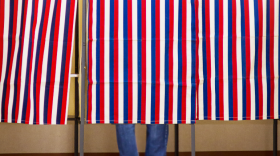It was an unusually long election night on Tuesday, and while some of the results are still unknown, there were more than a few surprises as the vote tally rolled in.
Here with some analysis of what's going on with the electorate in New Hampshire is Chris Galdieri, an Assistant Professor of Politics at Saint Anselm College and Tom Rath, former New Hampshire Attorney General and long time Republican Party strategist.
First to you, Tom, President-Elect Donald Trump...your reaction?
Rath: Well, I think it's remarkable. We think we know so much about what's going to happen before it happens, and then the voters remind us at the end of the day that they're in charge. The press running up to it said at best, Trump had a very tortured and tough path. Well, he had a path and he found it. It is one of the most remarkable upsets I've seen in presidential politics in probably close to fifty years.
I think the word "unprecedented" isn't too far to go.
Rath: I think that's fair.
?And I think going into it, pundits and pollsters thought it was a narrow but assured lead for Hillary Clinton. And then, as the night went on, I think things kind of flipped on their ear.
?Rath: It's got to be. They've been running for this for almost ten years, if you think about it. Because they ran against Obama eight years ago. They've always been kind of a government in exile, and they really felt like the prize was within reach at this point. And certainly all the data suggested it. But the uniqueness of the Trump approach, and the ad hominem nature of his ?campaign galvanized people who are not typically part of the process. When you catch lightning in a bottle, it's pretty tough to stop.
Do you think mainstream Republicans were expecting this? Were you expecting anything like this?
??Rath: To be honest with you, no. I had looked at way too many polls and seen way too many numbers, and too many things had to go right to make it work. Well, they all went right. The funny thing about voters, and predicting them, is sometimes they just vote. And you think you know so much, and they'll say, "I'll make up my own mind."
?Certainly there'll be a lot of dissecting, here, of the numbers. Of who did vote, and were there a lot of voters who were disenfranchised for years who came back, that kind of thing. Chris Galdieri, none of these polls predicted this. What went wrong in your opinion?
?Galdieri: I think we're going to need some more time to figure that out. But when we say there was a poll failure; there was a catastrophic, across the board poll failure. Public polling, private polling by both campaigns. Yesterday morning, everybody's model had sort of converged to Clinton, plus 322 electoral votes, and obviously, that's not what happened. It may be that fewer and fewer people have landlines, so it's harder to poll people. Not reaching people with cellphones, not reach millennials, not reaching rural voters, perhaps. But something went wrong. But it went wrong for everybody. It's not that one poll from 1936 that got the Roosevelt-Landon results backwards. This was just something systemic that went wrong.
?Going forward, how about some democratic soul searching? Where does the party go from here? This wasn't just the presidential race. This was a resounding defeat across the country.
??Galdieri: That's right. I think democrats were really looking forward to 2016 as the year that they would get payback for the 2010 midterm election. They thought they could make pickups in Pennsylvania and Wisconsin --
?There was talk about Texas.
??Galdieri??: Exactly. Exactly. All those big maps we saw right after the Democratic Convention, right after the final debate, and then they just sort of shrank. Suddenly Utah wasn't in place. Suddenly Georgia was not in play. And I think it comes down to is that that support that it looked like there was for Clinton was very brittle. And I think, in particular, the James Comey letters probably lead a lot of Democratic leaning voters, or infrequent democratic voters to stay home rather than turn out.
?Let's move on to the race of the moment that still hasn't been called: Ayotte and Hassan. Obviously tens of millions of dollars poured into this race from outside interest. Tom, what's your reaction to this race? It's still too close to call at this hour -- two-tenths of a percentage point apart.
?Rath: If you'll allow me to reflect on my age; I've been to this movie. I did Wyman/Durkin back in 1974, which ended up [down to] two votes. And then we actually had to have a recount. We had a recount and then we had a re-vote. We had a special election to decide because the senate refused to seat the winner that New Hampshire certified.
?Do you see anything like that happening again?

?Rath: I think we'll have a very extensive and hard-fought recount in that there is going to be a test to see whether every particular piece of the process was done exactly right. For instance, somebody will come in the room and say, "I challenge every single ballot that doesn't have an 'X' mark, but a check mark." Because the statute says 'X' marks. Well, that's going to get thrown out.
?In our case, is the oval filled in completely?
?Rath: Right. It's the same thing. There will be challenges like that. It will come down to -- and I think right now both parties probably know where the problem is. They have done their own spreadsheets. They have a pretty good sense of where there may be some deviation. I was surprised at how specific Governor Hassan was last night. So, they obviously think a significant number of votes didn't get in the mix. And we keep hearing it's in the Keene area, because Keene reported early, but may not have been added into the mix. But, on the other side of it, the Ayotte people really believe that they've got the right numbers, too. They're going to have to sit down, and sort it out. That process is straight forward. It should take about a week. But there'll be a lot of legal challenges, and I know there are teams of lawyers, even as we speak, flying up here, briefcases in hand.
?So you expect, with maybe a two-tenths spread right now -- maybe 1,500 voters -- there will be some kind of recount?
??Rath: New Hampshire is a great object lesson for people who say every vote matters.
?Alright. Chris, regardless of whether Ayotte wins, it looks like republicans will maintain control of the U.S. Senate, along with the House. So, what does that mean, going forward?
??Galdieri??: It means we have a unified Republican government in Washington for the first time in ten years. That unified Republican government is a party that is much more conservative than it was in many ways ten years ago. But it's being lead by Donald Trump, who kind of rejects conservative ideology whenever he feels like it.
?And kind of ran on that.
?Galdieri??: Exactly. And you saw this come up again and again during the primaries. In the debates, he was attacking Scott Walker from the left, he was making attacks that wouldn't have sounded any different than a democrat running against Walker for Governor of Wisconsin would have. And so it's a question of whether Trump and the congressional republicans can work together. Do they want to work together? Do they just agree to give each other everything that they want and move forward? But with the democrats having maybe 47, 48 votes in the senate, there is not a whole lot that they're going to be able to do in terms of influencing what's coming out of Washington for the next at least two, maybe four, maybe eight years.
?So, the Republican party will own it?
?Galdieri: They will own it, yes.
?Tom, you endorsed John Kasich in the primary. Kasich never backed Trump, expressing concern about Trump's rhetoric. Does Trump represent the party as you see it?
?Rath??: I think the Senate Republicans represent the party. I think Donald Trump has a very unique strain of almost personality-driven politics, and persona-driven politics. Our party -- the good news is we won. The bad news is, we have to figure out who we are.
?The last quick question -- Chris Sununu wins the Governor's race, looks like he'll come into office, Republicans retaining control of both the State Senate and the House, as well as the Executive Council. What do you think is on the agenda for first come?
??Rath: Well, the first thing every Governor does is the budget. Sununu is a numbers guy, he likes to go line-by-line, he's got a very, very friendly state senate, probably still lead by Chuck Morse. I think we're going to see one of the quickest budget sessions we've seen in a long time.
?And that would be different, too. Because we've had some protracted fights on that.
?Rath: Yeah. It will go down to the end, but I think there will be plenty in a very small piece of field.








